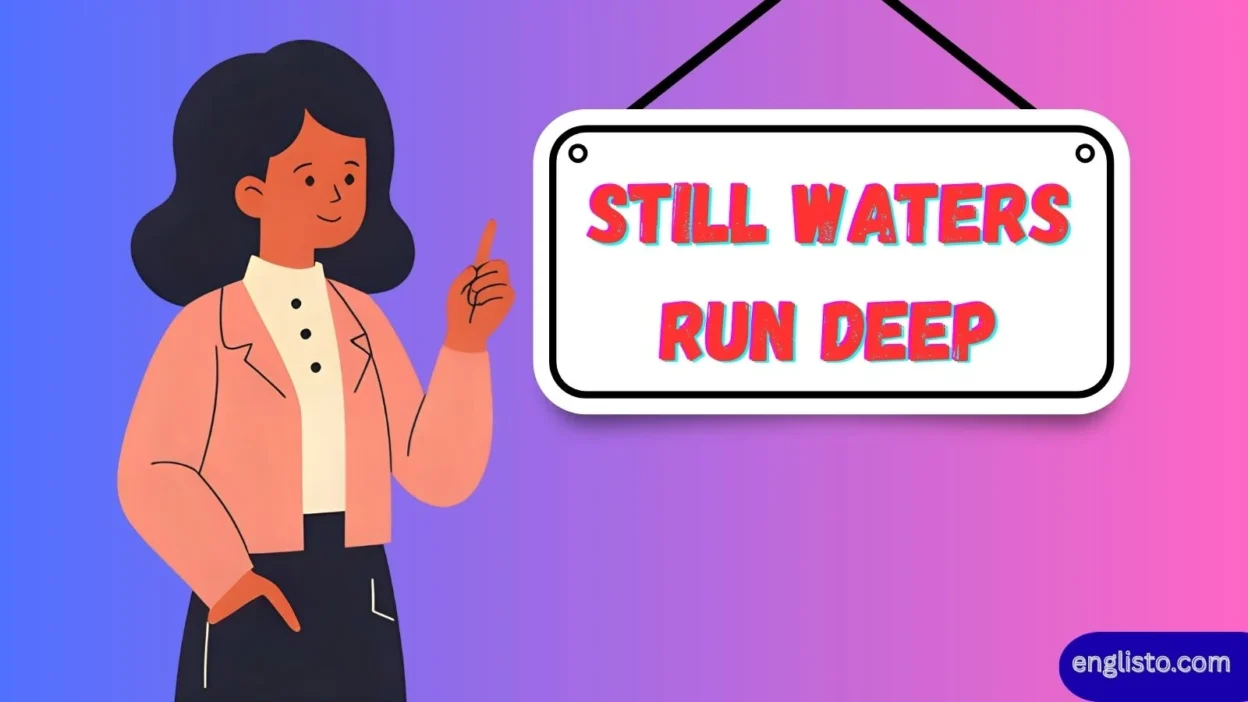When you hear the proverb “Still waters run deep,” it immediately paints a picture: calm on the surface, yet hiding great depth below. This phrase has traveled across centuries, cultures, and even languages, reminding us that quiet or reserved people often have profound thoughts, emotions, or wisdom concealed beneath their calm exterior.
It’s an idiom used in literature, conversation, and even psychology to describe people who are unemotional, shy, withdrawn, or very hard to get to know—yet are surprisingly interesting, complex, and insightful once you truly see who they are.
In this article, we’ll explore:
- The meaning and grammar of still waters run deep
- Historical origins and literary appearances
- Synonyms, translations, and variations across cultures
- Real-life usage, examples, and modern implications
- Tables for quick learning, comparisons, and context
This is more than just an idiom—it’s a timeless reminder not to judge a book by its cover.
The Meaning of “Still Waters Run Deep”
The proverb “still waters run deep” refers to people or situations that appear calm, reserved, or uneventful on the surface but hide great complexity or intensity beneath.
- Figurative meaning: Someone who doesn’t speak much may be more thoughtful, intelligent, or even passionate than they seem.
- Literal origin: Just like a quiet river can be surprisingly deep and dangerous, people who are reserved may have profound inner lives.
Key idea: Quietness does not equal emptiness.
Common Usage Examples in Sentences
- John rarely speaks in meetings, but when he does, it’s clear that still waters run deep.
- Her calm demeanor fooled many—still waters run deep, after all.
- Anthony Trollope once wrote characters who embodied the saying: still waters run deep.
Historical Origins of the Proverb
This phrase isn’t modern—it has ancient roots.
- Classical Times: The Latin proverb altissima quaeque flumina minimo sono labi (“the deepest rivers flow with the least sound”) dates back to Roman writers.
- Shakespeare (1590): In Henry VI, Part 2, the Duke of Gloucester warns:
“Smooth runs the brook that babbles not aloud;
Unsounded yet, it runs both swift and deep.” - European Proverbs: The saying appears in Italian collections (1490) by Laurentius Abstemius, later expanded into Hecatomythium and adapted across languages.
- English Literature: By the 15th century, it was firmly established in proverbs and sermons.
Quick History Table
| Era / Source | Example / Note |
| Roman Times | Latin: altissima quaeque flumina minimo sono labi |
| 1490 Italy | Laurentius Abstemius fable |
| 1590 England | Shakespeare’s Henry VI, Part 2 |
| 1692 | Roger L’Estrange, English fable collection |
| 1855 France | La Fontaine’s edition illustrated by Grandville |
| Modern Times | Commonly used in idioms, psychology, and literature |
Synonyms, Variations, and Related Idioms
Different languages and cultures convey the same wisdom with their own twists.
Synonyms and Related Expressions
- Silence speaks volumes
- Don’t judge a book by its cover
- Quiet but profound
- Reserved yet thoughtful
- More than meets the eye
Translations
| Language | Translation | Meaning |
| Chinese (Traditional) | 靜水流深 | Silent waters flow deep |
| Chinese (Simplified) | 静水流深 | Same as above |
| French | Il n’est pire eau que l’eau qui dort | No water is worse than sleeping water |
| Latin | Altissima quaeque flumina minimo sono labi | Deepest rivers flow with least sound |
| German | Stille Wasser sind tief | Still waters are deep |
Many proverbs caution against underestimating the quiet or seemingly harmless.
Psychological and Social Insights
The idiom has powerful relevance in psychology and human behavior.
- Introverts: People who are shy, reserved, or withdrawn often process information deeply and may surprise others with their insights.
- Emotional depth: Someone who rarely shows emotion may contain great sensitivity or passion.
- Social caution: A reserved personality might hide danger, just like a river with a calm surface but dangerous depth.
Personality Traits Table
| Surface Impression | Hidden Reality |
| Quiet, unemotional | Thoughtful, sensitive, intelligent |
| Shy, withdrawn | Passionate, complex inner life |
| Calm, placid | May harbor strong convictions |
| Disinterested look | Careful observation and reflection |
Real-Life Applications
This proverb applies to everyday life, literature, and even business.
- At Work: The quietest colleague may have the most valuable ideas.
- In Relationships: A reserved partner may prove to be the most thoughtful and loyal.
- In Literature: Authors like Shakespeare and Trollope used the phrase to illustrate mysterious or wise characters.
- In Cautionary Tales: Folk sayings remind us that danger can lurk beneath calm exteriors—whether in people or situations.
Example from Modern Media
In The Times (2015), a columnist described a politician as “the epitome of the phrase still waters run deep,” emphasizing that quiet people can be highly influential.
Grammar and Usage Guide
The phrase is a proverb/idiom and functions as a complete sentence or a descriptive clause.
- Correct form: Still waters run deep.
- Misspelling to avoid: Still water runs deep (wrong).
- Grammatical structure:
- Subject: Still waters (plural)
- Verb: run (plural form)
- Object/Complement: deep
- Subject: Still waters (plural)
This explains why “waters” is plural: it refers collectively to rivers, streams, and bodies of water.
Cultural and Literary Examples
- Shakespeare’s Gloucester: Warned of treachery beneath a smooth exterior.
- Anthony Trollope (1869): Wrote, He Knew He Was Right, illustrating quiet characters with hidden turmoil.
- French proverb: Emphasizes hidden danger: Il n’est pire eau que l’eau qui dort.
- Cambridge University (1590s): Local authorities even used the phrase metaphorically when describing “reserved” troublemakers in punishment reports.
Idiom in Modern English Learning
Today, dictionaries like Collins, Dictionary.com, and the Oxford Concise Proverbs list the idiom with explanations and examples. It also appears in English-learning apps, idiom quizzes, and language blogs.
Example from Collins Dictionary:
If you say that still waters run deep, you mean that someone who seems quiet may in fact be passionate or intelligent.
Quick Idiom Learning Table
| Feature | Details |
| Idiom type | Proverb |
| Register | Slightly old-fashioned but still widely used |
| Common contexts | Describing people, personalities, cautionary advice |
| Difficulty | Easy to learn, but rich in meaning |
Why the Idiom Still Matters
Despite being centuries old, the proverb remains relevant:
- It reminds us not to underestimate people.
- It teaches humility—quiet strength often outweighs loudness.
- It resonates across cultures, proving its universal truth.
As the saying goes, “Empty vessels make the most noise.” The quiet ones, often, have the richest depths.
FAQs About “Still Waters Run Deep”
Q1. What does “still waters run deep” mean in simple words?
It means quiet people often have strong emotions, intelligence, or depth hidden inside.
Q2. Is it a compliment or an insult?
Usually a compliment, but it can also be a warning—calm exteriors sometimes hide danger.
Q3. Who first used the phrase?
Its roots are Latin, but Shakespeare popularized it in English during the 16th century.
Q4. Is it still used today?
Yes. It appears in media, books, psychology, and everyday conversations.
Q5. What’s a similar proverb in English?
“Don’t judge a book by its cover” and “silence speaks volumes.”
Conclusion
The proverb “Still waters run deep” is more than an old-fashioned saying—it’s a timeless observation about human nature. From Roman philosophers to Shakespeare, from French proverbs to Chinese translations, it carries the same message: quietness often hides wisdom, strength, or danger.
In life, work, and relationships, we should remember that the calmest people may have the deepest thoughts. Next time you meet someone reserved, think of this proverb—you might just discover an ocean beneath the surface.



